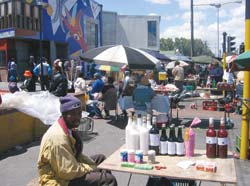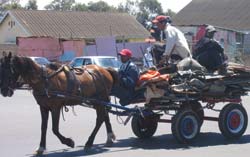Life in Grade 12
An aspiring filmmaker finds volunteer work opens her eyes to the dreams
of young South Africans
By Molly Blank, J98
Eighteen-year-old Babalwa Ngcofe calls home a four-room shack in Nyanga, a black township outside of Cape Town, South Africa. She lives with her parents, a brother and sister, five cousins, and one cousin’s baby; she falls asleep each night in a room with five other people and dreams of becoming a lawyer.
A few blocks away, Sipho Mpaku, 21, wakes up to responsibility. First, he makes porridge for his brothers. At ages 15 and 10, these boys rely on Sipho for most things. His parents are divorced and live in separate homes. While the porridge is boiling, he irons his brothers’ school uniforms and polishes their shoes.
“My life is hard,” says Sipho. “I’ve suffered enough. My brother is an alcoholic. My sister is working nights and she might go to her boyfriend’s for a week or two. I am like a parent.”
Yet each morning, Babalwa and Sipho join a stream of students headed for Oscar Mpetha High School. The school sits on a corner in Nyanga, just a few kilometers from Cape Town’s international airport, across from a noisy taxi rank crowded with smoke and filled with the noise of beeping horns and hawkers selling everything from fruit to deodorant. Behind its large gate, Oscar Mpetha has 1,500 students, 30 classrooms, and 44 teachers—actually, right now, 45. For the past five months, I have been teaching grade 12 English here. Babalwa and Sipho are just two of my 120 students.
I began volunteering at Oscar Mpetha in April 2005 while on a Fulbright Scholarship in South Africa. One day, the English teacher asked if I would take over her classes for a few days while she was out. It worked well, so with my two years of experience as a teacher in an under-resourced community in the United States, I quickly moved from volunteer to substitute teacher. When the teacher left in July for a five-week exchange program in Germany, I became the real teacher. I did not plan for this to happen. I simply wanted to get involved in a school community to learn more about the education system here.
 |
| Photo courtesty of Molly Blank, J98 |
I was awarded a Fulbright to make a documentary about education, not to teach. I soon realized that there was an important story to tell right at Oscar Mpetha. Life in Grade 12 is a documentary film about Babalwa, Sipho, and their 46 classmates in 12A at Oscar Mpetha. It follows them through the last four months of school, as they work toward and take their crucial final exams—the so-called matric or matriculation tests, which determine their access to university, jobs, and, ultimately, future success.
I had no idea when I started how entrenched I would get in my students’ lives and what a profound impact they would have on mine. Here, I am a teacher, a social worker, an employer (my students are also my production assistants), a confidante, a filmmaker, a questioner, and a friend—and I am changed forever.
Grade 12 is the pinnacle of my students’ academic careers, for many the most important thing they have endeavored in their lives.
“I believe that these exams are the highlight of my life,” says Babalwa. “They are the ones that are going to let me live my dream and fulfill my goals. If I fail them, some doors will be closed for me, and if I pass them, many doors will be open for me to achieve what I want.”
While this is the Nyanga of a young, free democracy, it is impossible to miss the glaring inequities that persist. This township does not look that different than it did just 11 years ago when apartheid ended—people are still poor and unemployed, family structures are now dramatically changed by the impact of HIV-AIDS, and schools are still struggling to give their students an adequate education. This school is less than perfect—classes are overcrowded, desks and chairs are in short supply, windows are broken, lashings as punishment are not unheard of, teachers don’t always show up for class, and many students I know are generally unsatisfied with their education.
“At times I feel that there is no hope for us, disadvantaged kids from schools like this,” says 18-year-old Mongamo Tyhala, another student of mine. He stays with his mom and 3-year-old brother in an informal settlement of shacks nearby. On the night before exams started, instead of studying, he was helping to put out a fire that burned down at least ten neighboring homes. The distance between the gates surrounding the homes of the black elite in the democratic South Africa and the students at Oscar Mpetha is vast.
 |
| Photo courtesy of Molly Blank, J98 |
Now that exams have begun, I anxiously anticipate the moment when results come out, when my students pass, when their names appear in the Cape Town newspaper. Many of them, like Sipho, will be the first in their family to complete matric. I have thought, too, about the tears that will come when some inevitably fail.
What is becoming increasingly apparent and a bit painful to me is that regardless of their success, the question remains, “What next?” What lies ahead for individual students if they pass matric and what awaits those who don’t pass, can’t find a job, or, like most, can’t afford further studies? How do they reach their dreams in a country where so many obstacles still remain?
Babalwa speaks passionately of her career as a lawyer, but she will study civil engineering next year because in grade 10 she received an engineering scholarship. “Beggars can’t be choosers,” she once told me. Mongamo has gotten into a civil engineering progarm at a local university but the 1200 rand in registration fees won’t be easy to come up with.
Sipho has seen the ocean only once, on the ferry to Robben Island, where Nelson Mandela was a prisoner, but his dream is to do maritime studies or join the navy. He has been provisionally accepted for a maritime program. Although he is committed to his studies, his exam results might not be good enough to get him a spot, and even if they are, without a scholarship, it will be impossible for him to study further. His English teacher had him apply to a job as a corrections officer at a nearby prison. She knows it isn’t what he wants, but she, like me, wants him to have something. When I asked if he wanted the job, the answer was simple: “If it pays me enough.” Right now he is hoping for a miracle to grant registration fees; if not, there will be no school for him next year. But I know the bottom line is survival, so I will have to accept it if his dream of sailing away on a ship is turned into the daily grind of a prison guard.
“I believe in myself and I can do it,” says Sipho. “There is no one I look up to, I don’t have a role model, I am my role model, myself. If I told myself I want to do this, then I will do it.”
I continue to be constantly inspired by my students, whose life experiences make them older than adults far beyond their age. I don’t know how they do it, but they remain the most hopeful kids I have ever met.
Exam results come out just after Christmas. Until then, we wait.
Molly Blank, J98, received a master’s in journalism from the University of California, Berkeley, in 2004. She can be reached at mollydblank@gmail.com.
|

